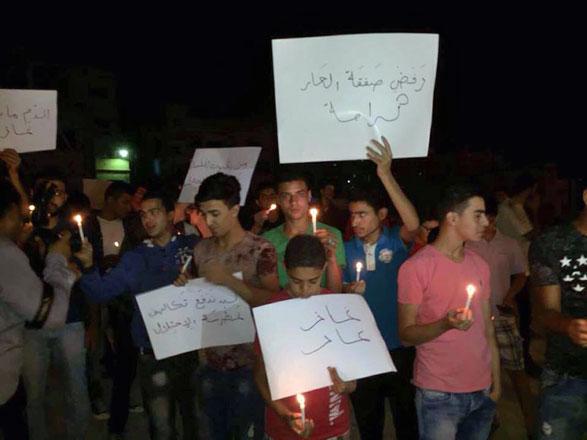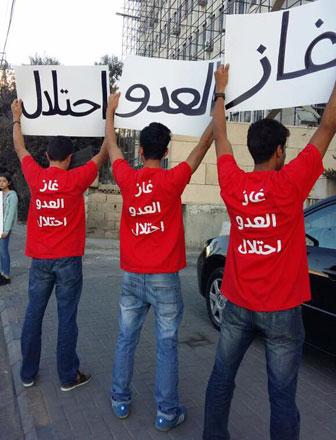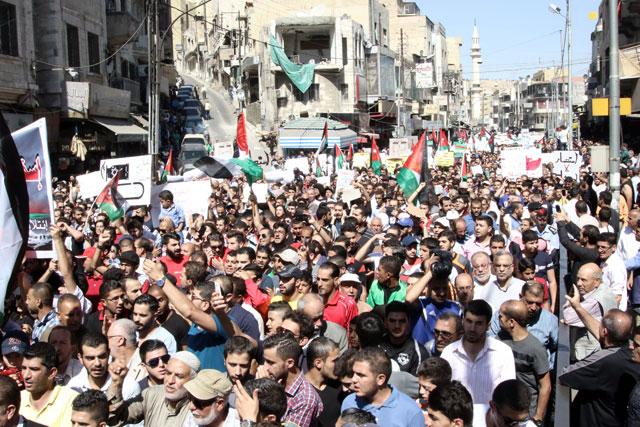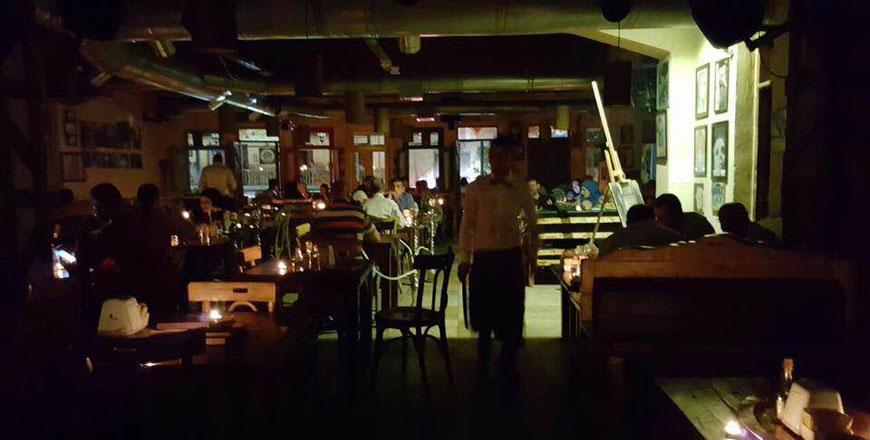You are here
Activists march by candlelight during blackout to protest Israel gas deal
By Suzanna Goussous - Oct 10,2016 - Last updated at Oct 12,2016

Protesters demonstrate against the gas deal with Israel in Hashemi Al Janoubi, Amman, on Sunday night (Photo courtesy of the Jordanian National Campaign Against the Gas Agreement with the Zionist Entity)
AMMAN — For the second time in two weeks, Jordanians on Sunday turned off their lights to protest the deal that the National Electric Power Company (NEPCO) signed to import gas from Israel in late September.
Residents of Amman, Irbid, Karak, Mafraq, Baqaa and Salt switched off electrical appliances for an hour at 9pm to show their rejection of the 15-year gas deal with US Noble Energy, a Houston-based company that holds the largest share in the Israeli Leviathan gas field, located in the Mediterranean Sea off the coast of Israel.
Activists from the Jordanian National Campaign Against the Gas Agreement with the Zionist Entity said that through marches, lectures, talks and initiatives, the public becomes “more aware of the deal” and “its impact on Jordan’s economy”.
Hisham Bustani, campaign director, said activists try to reach out to more residents with each initiative, adding that “it is a positive act that represents people’s understanding of such a deal and knowing the consequences of agreeing to it”.
“This time, the initiative was not only restricted to houses and switching off their electrical appliances, Jordanians in several areas around the country organised marches and held candles as they chanted anti-normalisation slogans,” he said.
People marched in Hashemi Al Janoubi, Hashemi Al Shamali, Baqaa and Irbid, Bustani added.
“This shows that people are alert and responsive. The method adopted by activists and members of different campaigns is the reason the public is more aware and we will all cooperate to step up our activities until the deal is cancelled,” he said.
Activist Basel Burgan, from the Boycott, Divestment and Sanctions (BDS) movement in Amman, said the campaign to switch off electricity is a “civilised way to spread awareness”.
“Many people said this initiative is of no use, but with more residents participating, we can inform them of the impact — through social media and several campaigns; people realised there was something wrong with the deal,” Burgan told The Jordan Times.
He added: “Those who participate and turn off their lights for an hour talk to their children about taking a stance when it comes to such causes.”
Other initiatives are planned for the upcoming weeks, such as boycotting the electricity company and not paying power bills for three months.
Coffee shops, restaurants, boutiques and businesses took part in the blackout on Sunday and turned off their lights.
Activists plan to participate in “nationwide” protests since residents of the governorates “denounce signing the gas deal with a Zionist entity”, Bustani said on Friday.
“Following the ban on the protest in Irbid last Friday, we will escalate our measures this week and shed light on aspects of the gas deal that people do not know about yet,” he added.
A protest will be held in the capital after Friday prayer in front of Al Husseini Mosque in downtown Amman, according to the campaign director.
The campaign will also work to submit a complaint to the Jordan Integrity and Anti-Corruption Commission over “suspicions” about the gas deal, he said, in addition to following up on the lawsuit filed against the government by the Jordan Bar Association and activists.
Activists called for another hour-long blackout on Monday, and for placing the Jordanian flag on buildings.
Prime Minister Hani Mulki has previously said the deal is a matter of national interest, and that it would pave the way for the Kingdom to find new energy sources while providing Jordan with the cheapest source.
Government Spokesperson Mohammad Momani has said the public needs to “put matters into perspective” regarding the gas deal since the Wadi Araba peace treaty with Israel was signed in 1994.
NEPCO officials say the gas deal with Noble Energy would “save Jordan up to $600 million each year”, with around 300 million cubic feet imported by the Kingdom daily.
Related Articles
AMMAN — Activists on Tuesday called on Jordanians to turn off their lights for one hour on Sunday to protest the recent gas deal between Jor
AMMAN — Activists across the Kingdom have organised protests and marches to demand the cancellation of the recent gas deal between Jordan’s
AMMAN — Activists and residents across the Kingdom turned their lights off for an hour on Sunday night to protest the gas deal between Jorda


















